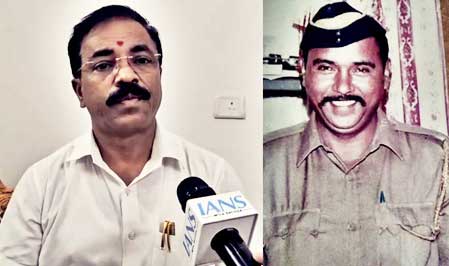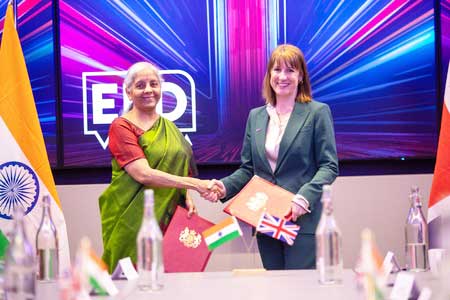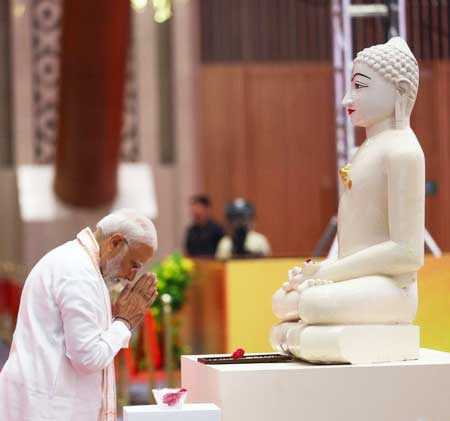Former WHO Chief Scientist and Deputy Director General for Programmes, Dr Soumya Swaminathan, who on Tuesday received the prestigious Yashwantrao Chavan National Award 2023, feels that India is well-equipped and has positioned itself to effectively tackle various challenges, including infectious diseases, new pandemic, climate change, and nutrition with the present institutional build-up, collaborative approach, new and emerging technologies, and research & development.
The daughter of noted agricultural scientist late M.S. Swaminathan, Soumya Swaminathan is the Chairman of the M.S. Swaminathan Research Foundation, who hopes that India will be able to produce a vaccine to tackle tuberculosis soon.
In an exclusive interaction with IANS, she spoke at length about the ways to tackle these issues. Here are the excerpts:
On Infectious Diseases
"There are different kinds of infectious diseases. We have TB, malaria, and those which are expanding their footprints globally such as dengue, chikungunya, and also the newly emerging infections which we cannot predict, but have to remain prepared against.
So we need to tackle infectious diseases from a scientific and public health point of view. We understand enough about transmission, so we know how to prevent it even though we may not have vaccines for some of these infections.
However, with the advancement of technologies, including genomics, and different platforms being developed, we are in a good position to be able to develop diagnostics, vaccines, and drugs. What we need is a collaborative effort, because these are very complicated and complex infections. They need vaccinologists, immunologists, virologists, epidemiologists, molecular biologists, physicists, and engineers. The collaborative efforts are likely to lead to new and innovative solutions.
The best way to prepare for the worst pandemic is to try to tackle the infectious diseases we have today. If we can use new technologies, we will be in an even better position to deal with the next pandemic.
Climate Change
Globally, India has been a strong voice on climate change and may be pushing for equity because the effects of climate change are not felt in countries, which are not major contributors to the phenomenon.
Unfortunately, even though our per capita contribution to greenhouse gases is extremely low, even lower than Africa, the brunt of the effect is being felt by us. Be it global warming leading to prolonged heat or floods, droughts, or cyclones, they are occurring more frequently now.
Whether it is an indirect effect of climate change through reducing the yield of major crops and potentially contributing to food and nutrition insecurity, there are many ways in which the climate is impacting our health today.
So, while India needs to have a strong voice on the global side and fight for equity, we need to look immediately at the adaptation measures as to how we protect the health and livelihood of millions of people, particularly the poor and the vulnerable, who are already just about managing.
We have rich agroecology and there is a lot of traditional wisdom in India to use our water sustainably. We knew how to build houses that were traditionally better able to withstand heat. Some of these things we need to go back to in order to protect the biodiversity that still exists. In the case of agro biodiversity, we have very diverse, rich varieties of rice, pulses, and millet, which have properties that make them resistant to climate change and droughts.
We have to invest again in our traditional ways of growing crops and harvesting water, so that we can start to mitigate some of the impacts of climate change, which are already being felt.
Nutrition
There is a lot of science in nutrition as well. It is critically important particularly for the young child though nutrition is important throughout the life course, but probably the critical period is pregnancy and the first two years of a child's life, what we call the first 1,000 days -- as that’s when the brain develops.
For India to be a developed nation with a $5 trillion economy, our human capital is our biggest asset, so we need to invest in human capital which is the health and education of young children. That is where we have to begin. We have to see our data, find out where we have done well, and where we still have gaps. We need to take a scientific approach to fill up those gaps.
We have to think of our strategies to achieve in a way that fits within our traditional food habits, and diet. We should not be resorting to drugs, medicines, and chemicals to solve the nutritional problems. They have to be addressed through a dietary option as it is the only sustainable way to improve nutrition.
Therefore, we have to look at agriculture as a solution to our nutritional needs and investing in this will pay off in the long term in terms of economic dividend.
It is also important to invest in children between the ages of six months and three years by establishing creches so that women can go to work and improve the women's labour force. It provides a safe and secure environment where children get physical and mental stimulation and nutrition. This will set a platform for a healthy childhood."








As Rana lands in India, 26/11 martyr Tukaram Omble's brother demands hanging of Tahawwur
On the day Tahawwur Rana, one of the co-conspirators in the Mumbai terror attacks was brought to India, Eknath Omble, the brother of Ashok Chakra awardee and 26/11 martyr Tukaram Omble, urged the central government to hang the terrorist and send a strong message to Pakistan.
India and UK reaffirm free trade agreement, support supply chains
Amid the changing world trade order, India and the UK have reaffirmed their commitment to furthering the bilateral relations between the two nations, including continuing negotiations at pace towards a mutually beneficial Free Trade Agreement (FTA) and Bilateral Investment Treaty (BIT).
Centre appoints special public prosecutor for 26/11 Mumbai terror attack case
The Central government has appointed Advocate Narender Mann as the Special Public Prosecutor for the 26/11 Mumbai terror attack case hearing.
Bhagwan Mahavir's ideals give strength to countless people, says PM Modi
Prime Minister Narendra Modi extended his greetings to the nation on the occasion of Mahavir Jayanti, saying Bhagwan Mahavir's ideals give strength to countless people worldwide.
Trump lowers levies on countries like India for not retaliating
US President Donald Trump on Wednesday announced a lower rate of 10 per cent for 90 days in reciprocal tariffs for trading partner countries that have not retaliated with higher levies on American goods — such as India — and further hiked the levy on China to 125 per cent for hitting back.
HM Shah says Rana’s extradition a major diplomatic win for Modi govt
Union Home Minister Amit Shah has lauded the extradition of Tahawwur Hussain Rana, a key accused in the 26/11 Mumbai terror attacks, as a defining triumph for the administration of Prime Minister Narendra Modi.
Tripura govt committed to preserving old culture, tradition: CM Saha
Tripura Chief Minister Manik Saha on Wednesday said that the BJP government is working to preserve old culture and tradition like Putul Khela (doll game), Jatra (folk theatre) and Natak (drama).